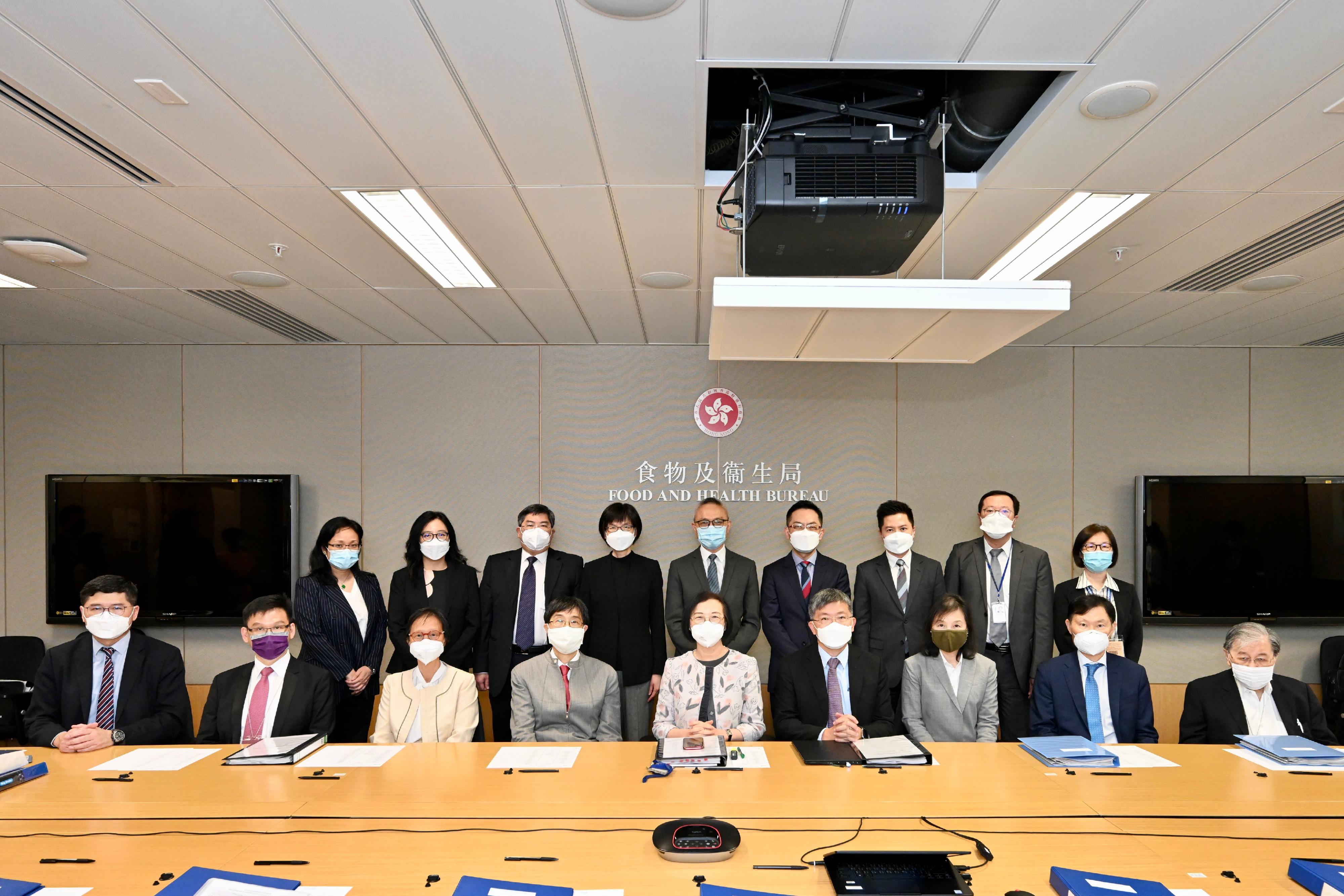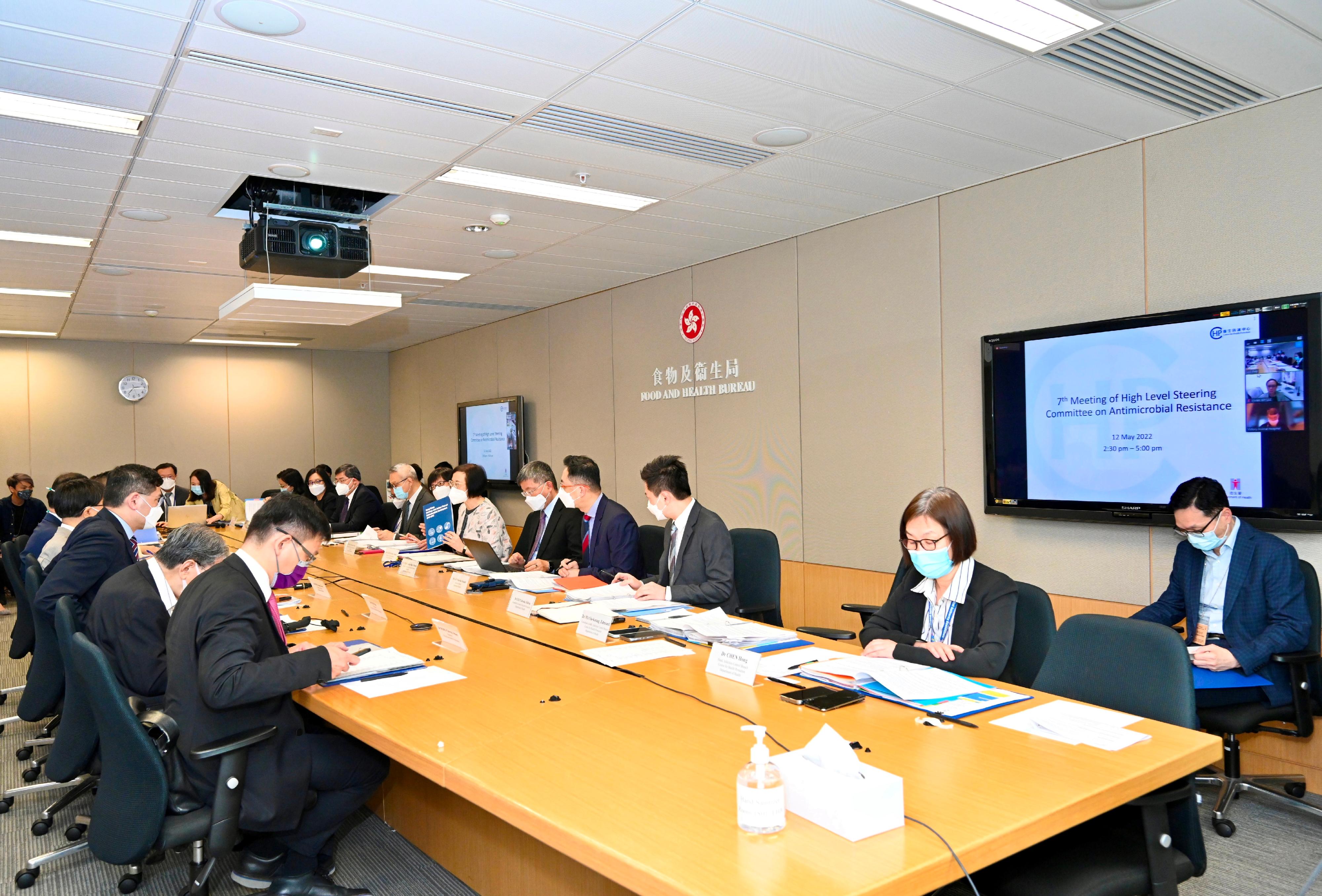SFH chairs seventh meeting of High Level Steering Committee on Antimicrobial Resistance (with photos)
The Food and Health Bureau (FHB) today (May 12) convened the seventh meeting of the High Level Steering Committee on Antimicrobial Resistance (AMR) (Steering Committee) to summarise the experience in the implementation of the Hong Kong Strategy and Action Plan on Antimicrobial Resistance (2017-2022) in the past five years, discuss with relevant Government departments and organisations regarding the next stage of the response strategies and formulate plans.
The Secretary for Food and Health (SFH), Professor Sophia Chan, said, "The Government launched the Action Plan in July 2017, outlining the key areas and objectives to combat AMR. Through the joint efforts of relevant Government departments and organisations in implementing the Action Plan over the past five years, we have achieved positive outcomes in minimising the emergence and preventing the spread of AMR."
The resistant bacteria arising either in humans or animals may spread from one sector to another, and continue to pose serious threat to public health. At the next step, the Government will continue to adopt the "One Health" approach as recommended by international health agencies as control and prevention strategies. Apart from human and veterinary medicine, agriculture and food, the Government will also explore the influence of environmental factors on AMR, and ways to address the issue of AMR by a comprehensive framework of strategies taking a multi-sectoral and whole-of-society approach. These strategies will be incorporated in the next Action Plan, which will be announced at the end of this year.
Since the launch of the Action Plan, a series of actions against AMR have been implemented by the Government in accordance with the strategies laid out in the plan. These include the establishment of One Health AMR Information System, stepping up of regulatory actions against illegal sale of antimicrobials, the launch of pilot programme on universal decolonisation of multi-drug resistance organisms in residential care homes for the elderly, the Antibiotics Stewardship Programme in public hospitals, support of AMR-related research through the Health and Medical Research Fund, organising publicity campaigns to raise public awareness of the threat of AMR, and strengthening the collaboration and partnership among different stakeholders. Surveillance data and reports were also published regularly by the Government. There was a continuous drop in the supply of antimicrobials to community pharmacies from 18.5 per cent in 2016 to 5.7 per cent in 2021. In addition, in 2020 and 2021, the proportion of the antimicrobials under the World Health Organization (WHO)'s "Access" classification reached 61.9 per cent and 65.8 per cent of the total antimicrobial supply in Hong Kong respectively, which were higher than the 60 per cent target set by the WHO. During the meeting, members of the Steering Committee also discussed the impact of COVID-19 on the work of combatting AMR over the past two years or so, and agreed that the Steering Committee should continue to monitor the situation closely and accord priorities so that the relevant work can achieve the best results.
As promulgated by the Chief Executive in the 2021 Policy Address-Supplement, the FHB will review the implementation experience of the first Action Plan and draw up the second plan to map out response strategies for the next phase.
During the meeting, the Steering Committee endorsed the next phase of the Action Plan (2023-2027). The next Action Plan will continue with the six key areas of the first Action Plan, which include strengthening knowledge through surveillance and research, optimising use of antimicrobials in humans and animals, reducing incidence of infection through effective sanitation, hygiene and preventive measures, improving public awareness and understanding of AMR through effective communication, education and training, encouraging relevant researches on AMR, and enhancing partnerships and fostering engagement of relevant stakeholders. Apart from continuing and strengthening the existing objectives and detailed actions, the next Action Plan will also feature a number of priority interventions and target indicators to enable the Government and stakeholders to focus resources and address the threat of AMR more effectively.
"I would like to express my sincere gratitude to the members of the Steering Committee for their time and efforts over the past years. They participated in the formulation of the first Action Plan, and have been reviewing the implementation progress of the relevant prevention and control measures, as well as assessing the local AMR situation and providing valuable advice on further controlling AMR. In particular, I am grateful to the Chairman of the Expert Committee on Antimicrobial Resistance, Professor Yuen Kwok-yung, and the Chairman of the Working Group on AMR One Health Surveillance, Professor Benjamin Cowling. They have all along been providing expert and practical advice regarding our work on surveillance and combating of AMR in Hong Kong. Their indispensable contribution allowed us to effectively address the threat of AMR,"Professor Chan said.
"In order to tackle the threat of AMR, close collaboration across the community is required. I call on everyone to continue working together to address the problem. Furthermore, healthcare professionals should follow the guidelines on the use and choice of antimicrobial, while patients should strictly adhere to doctors' instructions and should not use antimicrobial indiscriminately."
Chaired by the SFH, the Steering Committee was set up in May 2016 to call for collaboration, synergy and cross-fertilisation of all professional sectors under the "One Health" framework in response to AMR. It comprises representatives from relevant Government departments, public and private hospitals, healthcare organisations, academia and relevant professional bodies.

